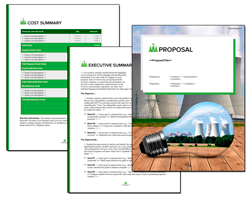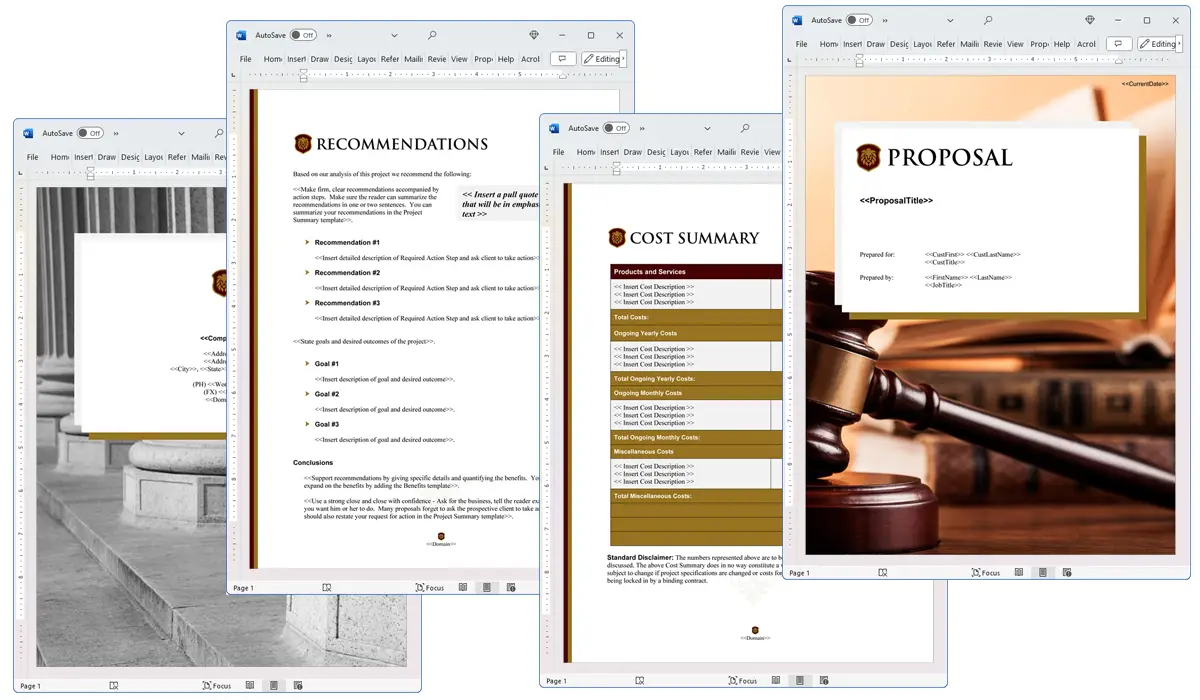What is the Project Constraints chapter used for?
Proposal Kit Professional Bundle adds more design themes, all six Contract Packs,
a project management library, and Expert Edition software.

Illustration of Proposal Pack Lawn #3
We include this Project Constraints chapter template in every Proposal Pack, along with thousands more. You assemble this chapter with others in various combinations to create custom-tailored business proposals, plans, reports, and other documents. Proposal Packs apply custom visual designs to the templates, giving the final documents a consistent professional finish.
 DOWNLOADABLE, ONE-TIME COST, NO SUBSCRIPTION FEES
DOWNLOADABLE, ONE-TIME COST, NO SUBSCRIPTION FEES
Overview of the Project Constraints Chapter
When assembling a business proposal, it's crucial to accurately outline any limitations that might affect the project delivery. The Project Constraints chapter serves this purpose by providing a clear and structured way to communicate all the known constraints that could potentially impact the project's design or capabilities. By defining these limitations early in the proposal, the involved parties can align their expectations and plan effectively, which helps in minimizing misunderstandings and setting realistic goals.
How is the Project Constraints Chapter Used?
In a business proposal, the Project Constraints chapter is typically used to detail the specific limitations that the project must operate within. These constraints could be related to budget, timeline, resources, legal issues, or technology. Including this chapter helps to ensure that all parties involved are aware of the factors that could restrict the project's execution. This awareness facilitates more informed decision-making and better project planning from the outset.
What is Included in the Project Constraints Chapter?
The Project Constraints chapter typically includes several key elements:
- Budget Constraints: Detailed information on financial limits and the budget allocated for the project.
- Time Constraints: Descriptions of any deadlines or time frames that must be adhered to.
- Resource Constraints: Information on the availability and limitations of resources, including manpower and materials.
- Technical Constraints: Details on technological or logistical limitations that could impact project delivery.
- Legal and Regulatory Constraints: An overview of any legal issues or compliance requirements that must be considered.
Use Case Examples for the Project Constraints Chapter
- Projects: In a construction proposal, outlining space and building material restrictions due to zoning laws and environmental regulations.
- Problems: In an IT service proposal, detailing the limitations posed by existing hardware and software infrastructure when upgrading a client's systems.
- Negatives: In a marketing campaign proposal, highlighting the constraints on advertisement placements due to budget cuts or market regulations.
Key Takeaways
- The Project Constraints chapter is important for setting realistic expectations and aligning project goals within known limitations.
- It covers various aspects of constraints including budget, time, resources, technology, and legal factors.
- Including this chapter in proposals helps in avoiding potential misunderstandings and disputes by making limitations clear from the beginning.
- It is applicable in diverse fields, from construction and IT to marketing and beyond, wherever limitations impact project execution.
- Effective use of this chapter can significantly enhance the planning and execution strategy of a project, leading to better outcomes and client satisfaction.

Illustration of Proposal Pack Energy #11
 What Our Clients Say
What Our Clients SayProposal Pack Wizard works great with Microsoft Office and Proposal Kit Professional. Using the Wizard to keep my files organized and looking professional helps my end results. My clients love the professional format and the clarity of my documents. That would only be possible thanks to both Proposal Kit and the Proposal Pack Wizard. The ease of use of both of these products makes working with proposals very fast and efficient use of my time."
The MacExperience, Inc.
 4.7 stars, based on 849 reviews
4.7 stars, based on 849 reviewsAlternate Chapters
Related Chapters
Samples Using the Project Constraints Chapter
Document Layouts Using the Project Constraints Chapter

The Project Constraints chapter and other chapters are integrated into a Word document as illustrated here in the Proposal Pack Legal #1 design theme. There are hundreds of design themes available, and every design theme includes the Project Constraints chapter template.
A proper business proposal will include multiple chapters. This chapter is just one of many you can build into your proposal. We include the complete fill-in-the-blank template in our Proposal Pack template collections. We also include a library of sample proposals illustrating how companies in different industries, both large and small, have written proposals using our Proposal Packs. This template will show you how to write the Project Constraints.
We include a chapter library for you to build from based on your needs. All proposals are different and have different needs and goals. Pick the chapters from our collection and organize them as needed for your proposal.
Using the Proposal Pack template library, you can create any business proposal, report, study, plan, or document.
The Wizard software includes an AI Writer, which will write the content of this and any other chapter of your document. Use the AI Writer to do the heavy lifting, writing the first draft of your proposal or business document in minutes.
 Ian Lauder has been helping businesses write their proposals and contracts for two decades. Ian is the owner and founder of Proposal Kit, one of the original sources of business proposal and contract software products started in 1997.
Ian Lauder has been helping businesses write their proposals and contracts for two decades. Ian is the owner and founder of Proposal Kit, one of the original sources of business proposal and contract software products started in 1997.By Ian Lauder
 Published by Proposal Kit, Inc.
Published by Proposal Kit, Inc.


 Cart
Cart
 Facebook
Facebook YouTube
YouTube Bluesky
Bluesky Search Site
Search Site